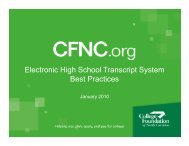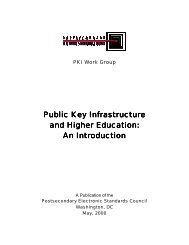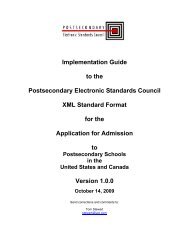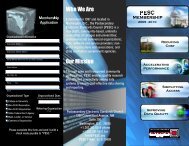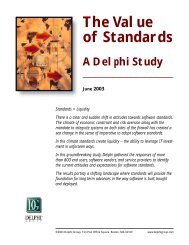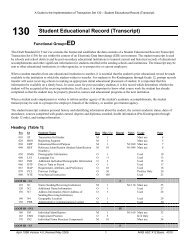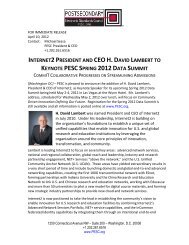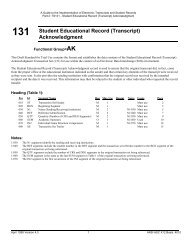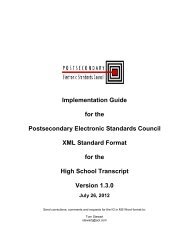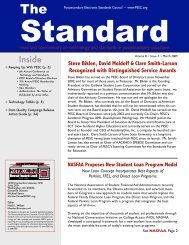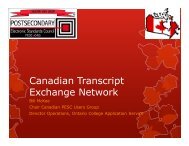February 2013 - PESC
February 2013 - PESC
February 2013 - PESC
Create successful ePaper yourself
Turn your PDF publications into a flip-book with our unique Google optimized e-Paper software.
FEB RUA RY 2 013<br />
Th e STANDARD NEWS A ND C OM M ENTA RY ON T EC HNOL OGY & STA NDA RDS IN EDUCA T ION<br />
aspirations for the best online learning. We include<br />
those principles as an integral addendum to the Bill<br />
of Rights below.<br />
Our broad goal is to inspire an open, learnercentered<br />
dialogue around the rights,<br />
responsibilities, and possibilities for education in<br />
the globally-connected world of the present and<br />
beyond.<br />
1. Bill of Rights<br />
We believe that our culture is increasingly one in<br />
which learning, unlearning and relearning are as<br />
fundamental to our survival and prosperity as<br />
breathing. To that end, we believe that all students<br />
have inalienable rights which transfer to new<br />
and emerging digital environments. They include:<br />
The right to access<br />
Everyone should have the right to learn: traditional<br />
students, non-traditional students, adults, children,<br />
and teachers, independent of age, gender, race,<br />
social status, sexual orientation, economic status,<br />
national origin, bodily ability, and environment<br />
anywhere and everywhere in the world.<br />
To ensure the right to access, learning should be<br />
affordable and available, offered in myriad formats,<br />
to students located in a specific place and students<br />
working remotely, adapting itself to people's<br />
different lifestyles, mobility needs, and schedules.<br />
Online learning has the potential to ensure that<br />
this right is a reality for a greater percentage of the<br />
world's population than has ever been realizable<br />
before.<br />
The right to privacy<br />
Student privacy is an inalienable right regardless of<br />
whether learning takes place in a brick-and-mortar<br />
institution or online. Students have a right to know<br />
how data collected about their participation in the<br />
online system will be used by the organization and<br />
made available to others. The provider should offer<br />
clear explanations of the privacy implications of<br />
students' choices.<br />
The right to create public knowledge<br />
Learners within a global, digital commons have the<br />
right to work, network, and contribute to<br />
knowledge in public; to share their ideas and their<br />
learning in visible and connected ways if they so<br />
choose. Courses should encourage open<br />
participation and meaningful engagement with real<br />
audiences where possible, including peers and the<br />
broader public.<br />
The right to own one's personal data and<br />
intellectual property<br />
Students also have the right to create and own<br />
intellectual property and data associated with their<br />
participation in online courses. Online programs<br />
should encourage openness and sharing, while<br />
working to educate students about the various<br />
ways they can protect and license their data and<br />
creative work. Any changes in terms of service<br />
should be clearly communicated by the provider,<br />
and they should never erode the original terms of<br />
privacy or the intellectual property rights to which<br />
the student agreed.<br />
The right to financial transparency<br />
Students have a right to know how their<br />
participation supports the financial health of the<br />
online system in which they are participating. They<br />
have a right to fairness, honesty, and transparent<br />
financial accounting. This is also true of courses<br />
that are "free." The provider should offer clear<br />
explanations of the financial implications of<br />
students' choices.<br />
The right to pedagogical transparency<br />
Students have the right to understand the intended<br />
outcomes--educational, vocational, even<br />
philosophical--of an online program or initiative. If<br />
a credential or badge or certification is promised by<br />
the provider, its authenticity, meaning, and<br />
intended or historical recognition by others (such<br />
31 <strong>PESC</strong> UNLOC K ING T HE P OW ER OF DATA



